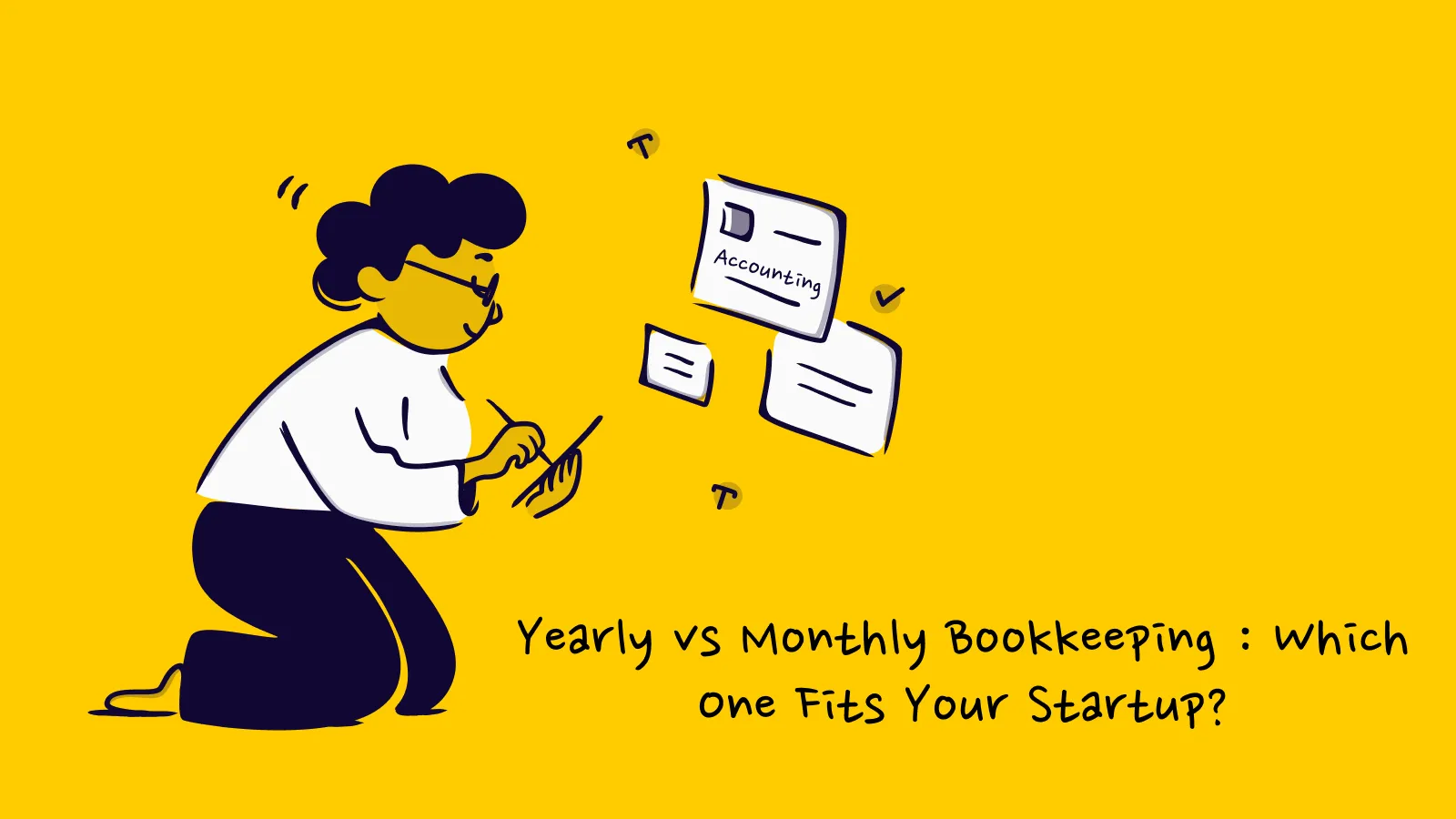Yearly vs Monthly Bookkeeping : Which One Fits Your Startup?

How often should your startup handle bookkeeping - once a year or every month?
The answer depends on your transaction volume, growth stage, and how quickly you need accurate insights. For small or early-stage startups, yearly bookkeeping might seem enough. But as financial activity scales, the need for up-to-date numbers becomes critical for decisions, compliance, and investor trust.
This article breaks down the key differences between monthly and yearly bookkeeping to help you decide which approach best fits your business. You’ll learn when yearly reviews are sufficient, when monthly tracking becomes essential, and how to choose a system that grows alongside your startup.
What’s the Difference Between Monthly and Yearly Bookkeeping
Both monthly and yearly bookkeeping aim to keep your financial records accurate but they differ drastically in how often they’re updated, and how much visibility they provide. Monthly bookkeeping keeps your finances current and supports proactive decision-making, while yearly bookkeeping focuses on summarizing the past once tax season arrives.
Here are some quick differences between these 2 methods:-
Now, let’s discuss the differences in detail:-
1. Monthly Bookkeeping Keeps You Ready Year-Round
Monthly bookkeeping means your books are updated every few weeks, not once a year. You always know your cash flow, profit, and runway. It helps you make confident decisions on hiring, fundraising, or new product investments. It’s especially valuable when you have active transactions, recurring revenue, or investor oversight.
2. Yearly Bookkeeping Focuses on Cleanup More Than Clarity
Yearly bookkeeping tends to be reactive. You gather data at tax time, clean up errors, and file. While it works for small or inactive businesses, it offers no real insight into how your startup performs month to month. If your goal is growth or fundraising, yearly bookkeeping won’t give you the financial clarity investors expect.
3. The Risk Gap Between Monthly and Yearly Tracking
When you only review your books once a year, errors go unnoticed for months. Duplicate entries, missed invoices, or uncategorized expenses can distort your financials and lead to compliance issues. Monthly bookkeeping catches these mistakes early and helps avoid costly corrections during audits or tax season.
4. Yearly Bookkeeping is Cheap Now or Costly Later
At first glance, yearly bookkeeping seems cheaper because it involves fewer updates. But the cleanup, penalty risks, and lost deductions often make it more expensive long-term. Monthly bookkeeping spreads out the work evenly, avoiding big year-end costs and keeping data accurate throughout the year.
Which Model Works Best for Your Stage
If your startup is actively scaling, handling multiple clients, or preparing for investor conversations, monthly bookkeeping is the right choice. For side projects, seasonal ventures, or paused businesses with minimal activity, yearly bookkeeping might suffice for now.
When to Choose Monthly Bookkeeping for Your Startup
As your startup begins handling more transactions, customers, and vendors, financial clarity becomes essential. Monthly bookkeeping helps founders stay agile by keeping reports current, ensuring compliance, and maintaining investor-ready records. It’s the system that allows you to make smart, data-driven decisions instead of relying on guesswork or year-end surprises.
Signs you’re ready for monthly bookkeeping
- You process regular monthly transactions. When payments, subscriptions, or expenses happen frequently, monthly tracking prevents backlog and confusion.
- You need accurate cash flow data to manage the runway. Up-to-date books help you forecast burn rate, plan expenses, and stay ahead of potential shortfalls.
- You’re preparing for or undergoing fundraising. Investors expect consistent financials and quick access to reliable data.
- You want to avoid last-minute tax season stress. Monthly bookkeeping means taxes are just a step.
- You’re scaling operations and hiring staff. Payroll, reimbursements, and vendor management become far easier with organized monthly records.
Monthly bookkeeping is the right fit when you need structure, speed, and accuracy to support growth. It helps founders see financial problems early, act decisively, and demonstrate credibility to investors without losing focus on scaling the business.
When Yearly Bookkeeping Might Be Enough
Not every business needs monthly bookkeeping from day one. For smaller or slower-moving startups, yearly bookkeeping can be sufficient, especially when transactions are minimal, cash flow is predictable, and there’s no immediate need for investor reporting. It’s a practical option for founders managing side projects, early prototypes, or seasonal businesses that only operate part of the year.
.webp)
When Yearly Bookkeeping Works Well:-
- Your business is part-time, seasonal, or temporarily paused. If financial activity is limited, yearly bookkeeping covers the basics without unnecessary cost.
- You have minimal income and expenses. Simple inflows and outflows are easier to reconcile once a year.
- You don’t require monthly financial reports or forecasting. If your decisions aren’t based on frequent financial updates, annual summaries may be enough.
- You’re not planning to raise capital or scale soon. Without investor requirements or rapid growth, yearly bookkeeping keeps operations lean.
Yearly bookkeeping suits businesses with low financial activity and limited reporting needs. However, once growth begins or you start managing more transactions switching to a monthly system becomes essential for accuracy, compliance, and long-term success.
What’s at Stake When Choosing the Wrong Bookkeeping Frequency
Choosing a bookkeeping schedule that doesn’t match your business’s pace can quietly create bigger problems over time. When financial data isn’t updated often enough, errors compound, compliance gaps widen, and decision-making becomes reactive instead of strategic. The longer you delay regular bookkeeping, the harder and costlier it becomes to fix issues later.
For startups operating in fast-moving markets, the risk is even higher. Growth decisions, tax filings, and fundraising efforts all rely on clean, timely financial data. Without it, founders face uncertainty, last-minute stress, and potential investor hesitation.
The hidden costs of choosing wrong bookkeeping method:-
- Yearly bookkeeping can delay cash flow visibility. You might not realize you’re running low on funds until it’s too late to act.
- Missed deductions or inaccurate filings reduce profitability. Disorganized books often lead to lost tax savings and higher filing costs.
- Founders lose time catching up during audits or fundraising. Cleaning up a year’s worth of records drains focus from growth and operations.
Bookkeeping is the foundation of financial control. When updates lag, startups lose visibility and credibility. Choosing the right frequency, especially monthly bookkeeping for growing companies means staying compliant, confident, and ready for every opportunity ahead.
How Inkle Helps Startups Handle Monthly or Yearly Bookkeeping with Ease
Whether your startup is just starting out or scaling fast, Inkle offers bookkeeping solutions that match your pace. For early-stage founders, yearly bookkeeping with automated cleanups keeps financials compliant without extra effort. As your business grows, Inkle helps you transition seamlessly into monthly bookkeeping with AI-powered automation that makes staying organized effortless.
Inkle connects directly with your bank accounts and accounting tools to sync transactions, categorize expenses, and reconcile data automatically. This means no manual entry, no messy spreadsheets, and no missed details. Whether you need investor-ready monthly reports or annual summaries for tax filing, Inkle delivers both with precision and speed.
Here’s how Inkle supports startups at every stage:
- Provides monthly categorization and reconciliation that keeps records accurate and filing-ready.
- Generates annual reports for smaller startups focused on year-end compliance.
- Offers smart recommendations on when to move from yearly to monthly bookkeeping as your startup scales.
With Inkle, you don’t have to choose between structure and simplicity; you get both. It’s bookkeeping that grows with your startup, helping you stay compliant, confident, and in control at every stage of your journey.
Ready to bring clarity and consistency to your books? Book a demo with Inkle and see how AI-powered bookkeeping can make your financial management effortless - month after month, or year after year.
Frequently Asked Questions
What’s the main benefit of monthly bookkeeping over yearly?
Monthly bookkeeping gives founders real-time visibility into their financial health. It helps you catch errors early, stay compliant year-round, and make faster, data-driven decisions rather than waiting until tax season to discover issues.
Is yearly bookkeeping risky for a growing startup?
Yes. With yearly bookkeeping, errors or missed entries can go unnoticed for months. This often leads to inaccurate filings, lost deductions, and last-minute stress during fundraising or audits.
How do I know when it’s time to switch to monthly bookkeeping?
If your transactions are increasing, you’re raising funds, or you can’t clearly answer questions about your cash flow and runway, it’s time to switch. Growing startups benefit most from the structure and visibility that monthly bookkeeping provides.
Can I start with yearly bookkeeping and move to monthly later?
Absolutely. Many early-stage startups start with yearly bookkeeping and upgrade once complexity grows. With platforms like Inkle, the transition is seamless automating categorization, reconciliation, and report generation.
Does monthly bookkeeping always cost more?
Not necessarily. While the upfront cost is higher due to more frequent updates, monthly bookkeeping often saves startups money in the long run. It prevents penalties, reduces tax preparation costs, and avoids the expensive cleanups that yearly bookkeeping can require.


.webp)
.webp)
